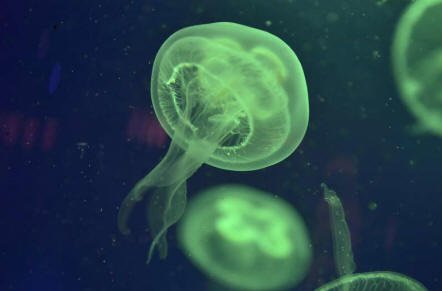|
|
|||
|
|
|||
Pakistan's premier website that covers current affairs and news.
Top 10 Business magazines in Pakistan
Time magazine - the best Current affairs weekly
Time magazine subscription in Pakistan
Bionic Jellyfish Can Swim Three Times Faster Using Less Energy after Being Fitted with Tiny Prosthetic
How can humanity better explore the unknown regions of Earth's vast oceans? Some scientists say they have found a promising new method: bionic jellyfish.

Space X Falcon 9
Share your views at editor.newsflash@gmail.com
Only a small fraction of the ocean has been explored, so we want to take advantage of the fact that jellyfish are everywhere already to make a leap from ship-based measurements, which are limited in number due to their high cost," John Dabiri, one of the lead researchers, said in a statement.
"If we can find a way to direct these jellyfish and also equip them with sensors to track things like ocean temperature, salinity, oxygen levels, and so on, we could create a truly global ocean network where each of the jellyfish robots costs a few dollars to instrument and feeds themselves energy from prey already in the ocean," he continued.
The prosthetic uses electrical impulses to impact the pulsing motion of the jellyfish and can boost movement speed from about 2 centimeters (0.8 inches) per second to 4 to 6 centimeters (1.5 to 2.3 inches) per second
While the electrical jolts made jellyfish swim about three times faster than the usual pace, they also used less energy to reach that speed, scientists said. That figure was measured by the amount of oxygen they had consumed as they were swimming, researchers noted.
The jolts made the prosthetic-equipped jellyfish "1,000 times" more efficient than swimming robots, experts found as part of the research. Jellyfish do not have a brain or pain receptors, the team note. however, they are known display signs of stress. As a result, the researchers closely monitored their stress levels during the experiment and found none had been harmed.
Jellyfish are about 95 percent water and do not have large organs like many other species found earth or sea.
"Lacking brains, blood, or even hearts, jellyfish are pretty simple critters," the NOAA's National Ocean Service explains on its website, noting their tentacles do have the ability to sting.
The Caltech team said jellyfish used in their research, which has been ongoing since 2013, went back to swimming normally after the small prosthetic was removed.
"We've shown they're capable of moving much faster than they normally do, without an undue cost on their metabolism," Stanford University graduate student Nicole Xu, co-lead on the paper, said in the statement. "This reveals that jellyfish possess an untapped ability for faster, more efficient swimming."
Researchers said the prosthetic is currently able to make the jellyfish start swimming and control the pace, but the next step will be to create a way to guide their movement and respond to signals. In future, the team could potentially embed the prosthetic in a jellyfish's tissue, Dabiri said.
Posted on January 31, 2020
Climate Change: Extreme cold sets in Afghanistan, Pakistan
India test-fires ‘quick reaction’ air defense system as tensions soar with Pakistan
Pakistan to restore visa services for Afghan nationals.
Water on Mars: New discoveries
Hashim Amla: South Africa batsman retires from international cricket

Send your contributions at editor@newsflash.com.pk
